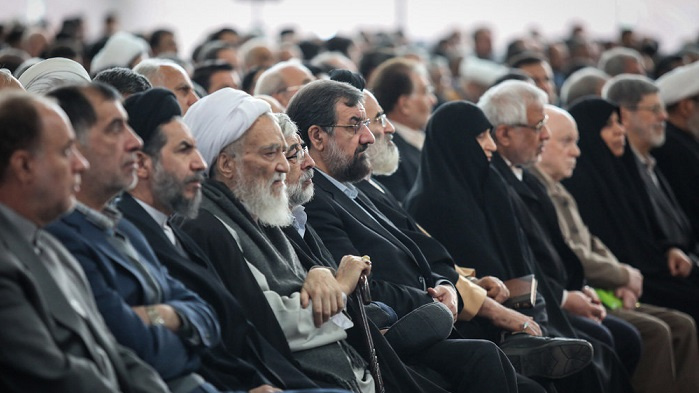Final Attempts toward a Principlist Coalition to Block Rouhani’s Reelection

(Senior Principlist figures attending the PFRF conventions. Saeid Goli/Mehr)
An umbrella apparatus that made headlines by its abrupt establishment in late December is quickly emerging as a unifying scripture for the Principlists around which they intend to choose final candidates who would challenge President Rouhani’s bid for reelection in the upcoming presidential race, slated for early May.
Apparently solicitous for weakening of revolutionary values, a foreign policy that leans toward the West, and economic difficulties befallen on ordinary people, the conservatives in Iran are resolved to fight tooth and nail against Hassan Rouhani’s reelection. However, they fear that the 2013 scenario, powered by internal division, could occur again, leading to yet another defeat vis-à-vis moderate Rouhani who backed by the Reformists.
However, part of the Principlist camp has already split ways with the mainstream. Ex-president Mahmoud Ahmadinejad, openly advised against a campaign by Supreme Leader Ayatollah Ali Khamenei, has declared that he will not back any candidate in the upcoming election, though some of his administration members have recently announced their intention to run.
First put on display on December 25 as a trans-partisan bottom-up democratic convention aiming to broker a mechanism for the Principlists to reach consensus on a single candidate for office, the Popular Front of Revolution Forces (PFRF), appeared to many as a still-aborning offspring of the conservative camp who would die away silently after the election, like its many seasonal power-broker precedents. Unsurprisingly, the selected ten founders of the self-proclaimed popular front, now often referred to by its Persian acronym JAMNA, mainly came from irrelevant lineage. Apart from three former ministers, a propagandist journalist and a Columbia University graduate conservative director have joined other low-key politicians. The highest profile, or the one most immediately remembered, belonged to Marzieh Vahid Dastjerdi, first post-revolution female minister of Iran, who assumed the spokesperson position in JAMNA. This gave ground to speculations that she might be allowed to run for office, if the Guardian Council opted to include women in its so-far male-oriented definition of statesmen. Since then, Vahid Dastjerdi has strongly denied she had any plans to launch a campaign.
On Thursday, JAMNA held its first general assembly summit, reportedly attended by 3000 individuals from 25 Principlist factions from across the country. The summit’s declared agenda was intensive: to pass the statute and manifesto of JAMNA as well as to elect 30 central council members and to arrive at a shortlist of ten presidential candidates.
The summit was held in the exhibition complex Shahre Aftab, located south of Tehran, which is built and boasted upon by sitting Tehran mayor and former presidential candidate Mohammad-Bagher Qalibaf who is believed to have already started an independent presidential campaign. Although organizing events of this kind in Shahre Aftab would need his green light, he did not show up in person for the general assembly meeting, which received exceptional publicity on media, with Principlist outlets of course on the front.
However, almost every figure affiliated with mainstream Principlism took part. Most notably, former presidential candidates Mohsen Rezaei and Gholam-ali Haddad Adel, interim Expediency Council chairman Ayatollah Movahedi Kermani, former parliament deputy speakers Mohammadreza Bahonar and Mohammad-Hassan Aboutorabi Fard, former ministers Yahya Ale Eshaq and Alireza Marandi, spokesperson of the Combatant Clergy Association Gholamreza Mesbahi-Moghadam, former Tehran mayor and the incumbent secretary-general of the conservative Islamic Coalition Party Mohammad-Nabi Habibi, and former MPs like Asadollah Badamchian, Mohammad Reza Mirtajoddini, and Elaheh Rastgou attended the summit.
Besides Qalibaf, big no-shows were Parliament Speaker Ali Larijani and former nuclear negotiator Saeed Jalili. The latter, too, is reportedly considering another presidential bid, after a failed attempt in 2013, where he finished third after Qalibaf.
The summit’s outcome was an all-inclusive 21-man list that included Qalibaf, Jalili, Mohsen Rezaei, Ezzatollah Zarghami, Mostafa Mirsalim, Mehrdad Bazpash and former petroleum minister Rostam Qassemi among others. One name that turned many heads was that of Hojjatoleslam Ebrahim Raeisi, the official custodian of Āstān-e Qods-e Razavi (AQR), the holy shrine of Imam Reza in Mashhad. Raeisi, now only 57, started a high-profile career in the country’s judiciary system at the age of 21, as attorney general of both Hamedan and Karaj, two counties approximately 340 km apart. A decade later, he rose to head the country’s State Inspectorate Organization. Last year, he was appointed by the Supreme Leader to serve as the successor to Ayatollah Abbas Vaez Tabasi as the guardian of the holy shrine in Mashhad, supervising the body’s cultural and industrial conglomerate worth billions of dollars.
PFRF members elected their central committee on Thursday, February 23, 2017 during their convention in Shahre Aftab. The highest number of votes went to Marzieh Vahid Dastjerdi, followed by former speaker of the parliament Gholam-Ali Haddad Adel and speaker of Tehran City Council Mehdi Chamran. However, the shortlist of presidential candidates which will include ten names is said to be announced soon. Will Principlists agree over a single candidate this time?

